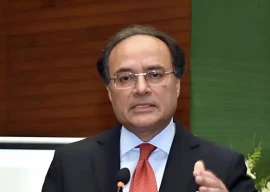
Strong public institutions, better research and policies that explore the potential of ignored commodities such as dairy products and horticulture could help improve Pakistan’s agriculture growth.
These were the thoughts expressed by Dr John Mellor, an American economist and Chief of the Pakistan Strategy Support Programme (PSSP), at a seminar titled “Agricultural growth and the economic transformation”, organised by the PSSP on Thursday.
Mellor said that government institutions must take the responsibility.
“Rapid agricultural growth requires high quality public institutions,” he said. “The private sector can supplement and support, but when you talk about national coverage for 3 million small commercial farmers, you need a strong public sector.”
He said that Pakistan could learn from India’s experiment with urban industry. He said the growth of large-scale goods and urban services industry, as a result of Manmohan Singh’s economic policies in the 1990s, did not pull agriculture sector because of weakened public institutions.
He said that US farmers change the wheat and maize varieties they use almost every three years because of extensive research on crop yields and better seed varieties. “But similar research institutions are almost absent in Pakistan.”

Mellor emphasised the need to focus on the unexplored potential of dairy industry and horticulture to push the overall agriculture growth rate as opposed to only focusing on the growth rate of wheat crop.
He also established a link between agricultural growth and poverty reduction.
“For Pakistan, agriculture growth is twice as more important in employment growth than Gross Domestic Product (GDP) growth,” Mellor said. “It is employment growth that reduces poverty.”
According to Mellor, the employment growth does not directly happen in the farm sector because the farmers who benefit from agricultural growth are already prosperous.
The poverty reduction takes place when small commercial farmers, who own cultivable tracts in the five to 150 acre range, use their incomes to buy non-tradable services and goods in their own localities, thereby increasing job opportunities for the rural non-farm sector in their area.
Mellor said Pakistan’s policymakers need to target the small commercial farmers in order to increase agricultural output. The five to 150 acre farms make up 36 per cent of all farms and 74 per cent of all cultivable land, he said.
Shahid Sattar, member of the planning commission, said, “Mellor’s discussion goes to the heart of our problem which is employment generation especially keeping in view the youth bulge.”
He said that we must not forsake agricultural sector in economic policies.
The PSSP, which aims to strengthen national capacity for making evidence-based policies to improve economic growth and food security, is funded by the United States Agency for International Development (USAID). It is being implemented by the International Food Policy Research Institute (IFPRI) and other partners under the guidance of a National Advisory Committee.
Published in The Express Tribune, February 22nd, 2013.

1735196035-0/beyonce-(7)1735196035-0-165x106.webp)





1724319076-0/Untitled-design-(5)1724319076-0-270x192.webp)
1726732405-0/Express-Tribune-Web-(15)1726732405-0-270x192.webp)


1735025557-0/Untitled-(96)1735025557-0-270x192.webp)











COMMENTS
Comments are moderated and generally will be posted if they are on-topic and not abusive.
For more information, please see our Comments FAQ